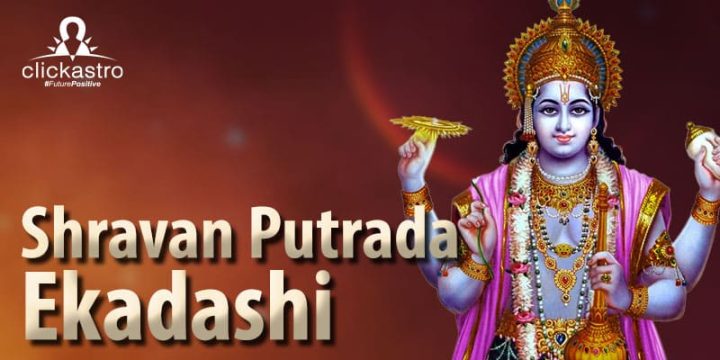Contents[hide]
Beyond the material blessings, Shravan Putrada Ekadashi imparts profound spiritual teachings as well. It underscores the transformative power of faith and the significance of letting go of desires to attain inner harmony. In its entirety, this Ekadashi serves as a reminder of the unbreakable bond between devotion and divinity, inspiring believers to embrace its lessons and embark on a journey of self-discovery, spiritual growth, and enlightenment.Shravan Putrada Ekadashi 2024 is on Friday, August 16.
Understanding Ekadashi:
Ekadashi falls on the eleventh day of both the waxing and waning moon phases. Occurring twice each month, Ekadashi is revered as a time of fasting, prayer, and deep spiritual reflection. With each Ekadashi associated with a distinct form of Lord Vishnu, its observance is believed to purify the mind and body, fostering spiritual development. In line with this tradition, Shravan Putrada Ekadashi stands out as a noteworthy event. Dedicated to Lord Vishnu, this particular Ekadashi is a joint observance by husband and wife, seeking the divine blessing of a son. Vaishnavas, devotees of Vishnu, hold this day in high regard. The term “Putrada” translates to “bestower of sons,” underlining the core belief that fasting on this day during the month of Shravan fulfills the wish for a male child. Celebrated with enthusiasm across India, except in the northern regions where Pausha Putrada Ekadashi takes precedence, Shravan Putrada Ekadashi emphasizes faith, devotion, and the quest for blessings that transcend generations.Shravan Putrada Ekadashi, important timings
- Sunrise – August 16, 2024 6:07 AM
- Sunset – August 16, 2024 6:54 PM
- Ekadashi Tithi Begins – August 15, 2024 10:27 AM
- Ekadashi Tithi Ends – August 16, 2024 9:40 AM
- Hari Vasara End Moment – August 16, 2024 3:16 PM
- Dwadashi End Moment – August 17, 2024 8:06 AM
- Parana Time – August 17, 6:08 AM – August 17, 8:06 AM
Shravan Putrada Ekadashi: A Glimpse into Mythology
The ancient kingdom of Bhadravati was ruled by King Suketuman and his renowned queen, Saibya. Plagued by the absence of a son, the king’s anxious contemplation led him into the depths of despair. He grappled with thoughts of his dynasty’s future, consumed by the weight of his legacy. Seeking solace, he embarked on a quest for a solution, traversing his vast kingdom and beyond, yet finding no respite from his burden.
Neither his wealth nor his menagerie brought him joy; even the offering of tarpana felt insipid in the face of his worries. His forefathers’ impending sorrow over the lack of descendants to offer homage troubled him deeply. His attempts to alleviate his anguish through ministers, friends, and loved ones proved futile. With his heart and mind solely focused on his yearning for a son, Suketuman’s distress deepened, driving him to contemplate even suicide.
Realizing the consequences of such a decision, he turned to the forest, a domain of diverse flora and fauna. Amidst his aimless wandering, hunger, thirst, and fatigue took their toll. While in this struggle, Suketuman pondered his fate, perplexed by his suffering despite his virtuous deeds. Eventually, he chanced upon a serene pond and ashramas, where benevolent sages resided.
In their presence, the sages explained that the day marked the auspicious Putrada Ekadashi, dedicated to obtaining a son. The king ardently observed the fast, earning the blessings of the sages and the Lord. As foretold, Queen Saibya conceived and bore a radiant son, who eventually became a just and revered prince.
The narrative of Suketuman’s trials and triumphs underscores the significance of Putrada Ekadashi. By steadfastly observing this holy day, devotees are believed to be blessed with offspring and eventually attain liberation. The story resonates as a testament to the transformative power of faith, devotion, and divine grace, emphasizing the timeless teachings of hope, determination, and the rewards of righteous actions.
The Rituals and Observance of Shravan Putrada Ekadashi:
Fasting as the central ritual: Fasting stands as the core ritual of Shravan Putrada Ekadashi. It holds special significance for couples aspiring for a male child. While some opt for rigorous fasting, others observe partial fasting. Grains, pulses, rice, onion, and non-vegetarian food are strictly off-limits for all on this sacred day.Preparations and timing:
The vrat commences on ‘Dashami,’ where followers partake only ‘Saatvik’ food before noon. Complete celibacy is practiced on the night of Dashami. The fasting period extends from the sunrise of Ekadashi until the dawn of ‘Dwadashi’ (12th day). The fast concludes after performing puja rituals and offering food to a respected Brahmin.Devotion to Lord Vishnu:
Devotees wholeheartedly worship Lord Vishnu on this auspicious day. The deity’s idol finds its place of honor in the worship area, receiving a ceremonial ‘Panchamrit’ abhishek (sacred bathing with five auspicious substances). Bright flowers, fruits, and other offerings are presented to the lord, signifying sincere devotion. Throughout the night, devotees maintain a vigil, singing bhajans and bhakti songs in praise of Lord Vishnu.Temple visits and evening reverence:
During the evening, followers also visit nearby temples dedicated to Lord Vishnu. These visits offer a chance for deeper spiritual connection. The atmosphere is charged with reverence and devotion, as devotees gather to pay homage to the divine.Jhulan festival:
Coinciding with Shravan Putrada Ekadashi, the much-celebrated 5-day ‘Jhulan festival’ commences. A jhula (swing) adorned with flowers and creepers becomes the centerpiece, holding the idols of Lord Krishna and Goddess Radha. The festival is a colorful and joyous affair, radiating devotion and merriment. This festive extravaganza reaches its culmination on the day of Shravan Poornima (full moon day).Spiritual Significance and Teachings of Shravan Putrada Ekadashi
In Hindu society, the quest for a male child holds profound significance, as the son is considered the pillar of support for aging parents and the conduit for performing ancestral rites, known as ‘Shraddha.’ Among the 26 Ekadashi observed in Hinduism, each holds a unique purpose. The Shravan Putrada Ekadashi, falling during the Shravana Shukla Paksha, is renowned for its ability to bless childless couples with male progeny. Beyond the boon of a male child, the devotees of Lord Vishnu embrace this Ekadashi to cleanse their souls of sins and attain salvation. The spiritual teachings encapsulated within this observance are manifold:- Family and Legacy: The emphasis on progeny underscores the role of a child in continuing a family’s legacy. It highlights the idea of nurturing values and traditions to be passed down through generations.
- Dharma and Duty: The performance of ancestral rites by the male child showcases the significance of one’s duty and Dharma. By fulfilling these responsibilities, individuals honor their ancestors and maintain the cosmic order.
- Devotion and Faith: Observing the Shravan Putrada Ekadashi symbolizes devotion and faith in the divine. By seeking divine intervention for a specific wish, individuals express their trust in the higher powers.
- Karma and Purification: The observance of fasting and rituals is seen as a way to cleanse oneself from sins. It reflects the belief in the law of karma and the potential for spiritual purification through righteous actions.
- Salvation and Liberation: Beyond material desires, the Ekadashi points towards liberation (moksha) as the ultimate goal. By following spiritual practices, one aims to break the cycle of birth and death.
- Unity of Family and Community: The rituals associated with this Ekadashi foster a sense of unity among families and communities. Observing it together enhances social bonds and spiritual solidarity.







